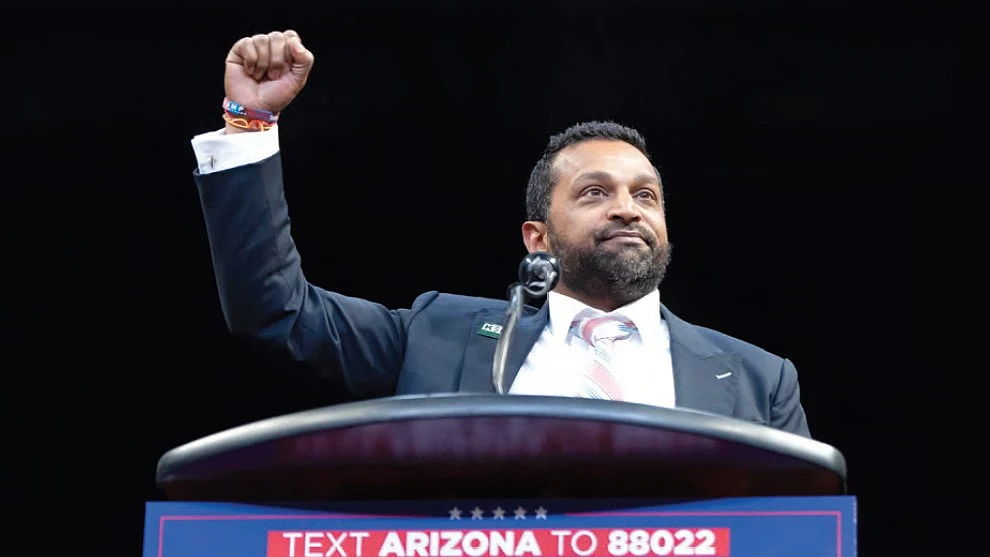World
Can ‘Kash’ Patel rescue Modi-Adani?
What could Trump’s choice of Kashyap Patel for FBI director mean for India? There’s concern about Patel in the Five Eyes community as well

Kashyap ‘Kash’ Patel, 44, of East African Gujarati origin, is among Republican Donald Trump’s recent high-profile nominations for his incoming administration. Real estate businessman and golf addict Trump was last month elected president of the US, defeating incumbent vice-president Kamala Harris.
Patel, a lawyer who was chief of staff to Trump’s secretary of defence in his previous 2016–2020 presidency, is the president-elect’s choice for the sensitive post of director of the Federal Bureau of Investigation (FBI), whose probing powers are worldwide.
John Bolton, who served as national security adviser in Trump’s first term, said, “The Senate should reject this nomination 100-0.” Vice-president-elect J.D. Vance retorted on social media, ‘John Bolton has been wrong about everything so I guess Kash must be pretty awesome.’
In the American system, the Senate, which will have a 53-47 Republican majority come January, as a result of the recent elections, is required to confirm Patel’s appointment before he can take charge.
Patel’s reputation is one of a ‘deep state’ conspiracy theorist. He has threatened to fire the FBI’s top brass and close its Washington headquarters. He’s an ultra-Trump loyalist who has published children’s books with ‘King Donald’ as a character.
New York-born Patel was reportedly brought up in an antiquated Hindu atmosphere, which is not untypical of East African Gujarati families. The Rashtriya Swayamsevak Sangh (RSS), after failing to make an impression in India following its formation in 1925, expanded to East Africa in the 1940s and was immediately more successful with Hindus there.
Published: undefined
Operating under the garb of an affiliate—the Hindu Swayamsevak Sangh (HSS)—it sustained its grip over Hindus who fled from Uganda, Kenya and Tanzania after experiencing or anticipating persecution by the new rulers of these decolonised countries in the early 1970s. The US was among the countries they ending up settling in, which today has an estimated 220 HSS shakhas.
HSS members and followers in the US, who constitute Narendra Modi’s hard-core drum-beaters, are also staunch supporters of Trump. Much to their liking, they think Trump is pro-India and anti-Muslim. Patel’s upbringing suggests he could be of the same ilk.
What could this mean for India and Indians? Should he make it to the FBI director’s office, Patel would enjoy considerable clout where the agency is involved.
On 20 November, when the indictments of Modi’s close friend Gautam Adani—of the Indian conglomerate Adani Group—and others on bribery charges were unsealed in New York, a concurrent press statement was issued by three officials. One of them was James E. Dennehy, assistant director in charge of FBI’s New York field office. He stated, ‘The FBI maintains its steadfast mission to expose all corrupt agreements, especially with international governments, and protect investors from related harm.’
Therefore, the FBI is very much party to the indictment. If Patel is confirmed, Dennehy would have to function under his overall authority. Having said that, overriding an indictment is difficult to implement and defend, unless there are loopholes in the evidence.
As a rule, US states are constitutionally more autonomous than their Indian counterparts, including in their criminal justice structures. Thus, the charge against the Indian government of having a hand in the attempted assassination of Gurpatwant Singh Pannun, a Khalistani fundamentalist, having been filed in a New York court is technically more problematic from an Indian standpoint.
In this case, the court has, in fact, summoned Indian national security adviser Ajit Doval to appear before it. This is awkward as well as embarrassing for Modi, in addition to restricting Doval’s overseas movements.
Published: undefined
Stickier for Modi, though, is Canada’s allegation that Amit Shah, the Indian home minister and Modi’s right-hand man, was behind a series of plots to murder and intimidate pro-Khalistan Sikhs on Canadian soil. The acts apparently include the assassination of Hardeep Singh Nijjar in a Vancouver suburb.
The north American press has been unambiguous in reporting that the FBI played an important part in assisting Canadian investigators to unearth evidence. This included the interception of phone calls, messages and other communications allegedly between Indian officials.
Will the FBI’s cooperation with Canadian authorities continue in the event of Patel becoming FBI director? While Canada has made explosive claims beginning with prime minister Justin Trudeau’s statement in the Canadian parliament in September 2023, it is yet to consummate these with formal charges in court.
In such seemingly inconclusive circumstances, the FBI’s continued collaboration could be vital. Will this be forthcoming under Patel’s stewardship? Or, to put it another way, would Canada trust a Patel-led FBI?
There are always deals within wheels, and New Delhi will hope that a quid pro quo between federal and state law enforcement authorities in the US might ease pressure. This would be above Patel’s pay-grade and will need Trump’s approval. Since he fancies himself as a deal-maker, he might well demand a pound of flesh in return from Modi.
Since the Second World War, Britain has been the US’s closest ally. Defence officials in London were reported by Britain’s Daily Telegraph to be ‘alarmed’ by Trump’s selection of Tulsi Gabbard, said to be an ISKCON follower—perceived in Whitehall to be ‘pro-Moscow’—as director of national intelligence, a role that involves overseeing 18 US intelligence agencies.
Drawing from a Western intelligence source, Politico suggested that Gabbard’s appointment could impact intelligence-sharing. In other words, US’s allies could be wary of giving away sensitive information—fairly routine among the Five Eyes group comprising the US, the UK, Canada, Australia and New Zealand—for fear that Gabbard would get sight of it.
The trepidation about Patel in the Five Eyes community is greater. Given his deep state phobia, secrets in his hands are deemed to be dangerous.
Published: undefined
Follow us on: Facebook, Twitter, Google News, Instagram
Join our official telegram channel (@nationalherald) and stay updated with the latest headlines
Published: undefined